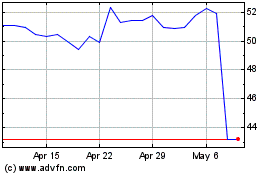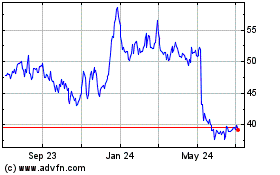Today's Top Supply Chain and Logistics News From WSJ
March 27 2018 - 7:01AM
Dow Jones News
By Paul Page
Sign up: With one click, get this newsletter delivered to your
inbox.
The White House may have provided a template for new trade
agreements in the pact just struck with South Korea. The deal came
in part because the two allies have a bigger common challenge ahead
in disarming North Korea, the WSJ's Kwanwoo Jun writes, but it also
sets a potential framework for other negotiations the U.S. has
underway or may be coming in the future. One trade expert in Seoul
says the new deal provides an "exemplary case" for Canada and
Mexico to follow, for instance, in renegotiating the North American
Free Trade Agreement. Seoul officials say they made only "modest"
concessions, and the deal is unlikely to shift trans-Pacific trade
flows much if at all. U.S. auto makers appear to be the biggest
winners, for instance, getting sharply higher quotas for exports to
South Korea. But the car makers are nowhere near reaching even the
current quota. South Korea also won a permanent exemption to new
U.S. steel tariffs, demonstrating the tariffs will likely be on the
table in negotiations with other countries.
Kansas City Southern's focus on international transport may
prove costly under the new U.S. tax law. A provision in the law
aimed at overseas income earned by U.S. technology and
pharmaceutical firms is hitting some unexpected companies, the
WSJ's Richard Rubin report, potentially including KCS freight rail
operations that lean heavily on U.S.-Mexico trade. KCS says the new
minimum tax will cost the company $25 million annually, the result
of a measure aimed at trademarks and patents held by tech and
pharma firms. KCS's assets are railcars, not patents, but the
provision resets the math on foreign tax credits that companies use
to calculate the taxes they pay abroad, and hits companies in
high-tax countries -- like Mexico. It's a quirk of the new tax
code, and it comes with another twist: U.S. companies could lessen
the impact by transferring some spending to a foreign country, and
out of the U.S.
China's automotive supply chain is getting much more global.
Volvo Cars plans to start producing sport-utility vehicles for the
business it jointly owns with Zhejiang Geely Holding Group Co., the
WSJ's William Boston reports, the latest step by the Chinese
company to take its Geely Auto business international. Under the
new plan, Sweden-based Volvo will produce vehicles at a plant in
Belgium for Lynk & Co, the business launched last year under
Volvo and Zhejiang Geely. The new operation follows the
announcement last month that the owner of Zhejiang Geely Holding
had amassed a nearly 10% stake in Germany's Daimler AG, the owner
of Mercedes-Benz cars, and it extends the technology and
operational tie-ups that are pushing the Chinese auto maker onto
the bigger international stage. Volvo will use technology it
developed for its own compact SUV in the new Lynk vehicle, saving
on costs and allowing the company to ramp up production
quickly.
SUPPLY CHAIN STRATEGIES
Sometimes suppliers just have to draw a line. Newell Brands
Inc., the maker of Sharpie markers and Paper Mate pens, has been
fighting in the aisles with Office Depot Inc., contending the
office-supply store wasn't doing enough to showcase its products
and even pulling back shipments to the retailer over the past year.
The WSJ's Sharon Terlep reports the impact hit Newell's
fourth-quarter sales, triggered a string of director resignations
and drew interest from activist investors. It's the latest and
perhaps most extreme example of the fraying relations between
vendors and store operators in a fast-changing retail environment.
Office-supply outlets are increasingly under pressure as customers
head online to buy staples, cutting into foot traffic and sales of
other products. Historically, retailers and manufacturers have
worked together to bolster sales. But conflicts are growing as
retailers lower prices to win back shoppers from Amazon and other
online sellers.
QUOTABLE
IN OTHER NEWS
The Federal Reserve Bank of Chicago's measure of U.S. economic
growth rose at a sharp rate in February. (WSJ)
China's central bank guided the yuan to its strongest level
against the U.S. dollar since its devaluation more than 2 1/2 years
ago. (WSJ)
Cosco Shipping Ports Ltd. more than doubled its net profit in
2017 to $512 million. (WSJ)
The Mexican government's airport company raised around $1.6
billion to partly finance construction of a new Mexico City
airport. (WSJ)
Britain's JD Sports Fashion is buying U.S. retailer Finish Line
Inc. for $558 million. (WSJ)
Building-materials supplier USG Corp. rejected a buyout offer
from Germany's Gebr. Knauf KG. (WSJ)
New Zealand's imports rose to a new high for a February.
(MarketWatch)
Singapore's manufacturing output jumped 8.9% last month on
strong semiconductor production. (Channel NewsAsia)
FedEx Corp. reserved 20 Tesla Semi trucks to test in its FedEx
Freight fleet. (Memphis Commercial Appeal)
Amazon.com Inc. is stepping up collections of state sales tax
but often leaves city taxes out of the mix. (New York Times)
Walmart Inc. named Simon Belsham, formerly of British retailer
Tesco PLC, as president of its Jet.com e-commerce business.
(TechCrunch)
Apple Inc. supplier Huayou Cobalt Co. is joining a group
promoting the ethical sourcing of cobalt. (Bloomberg)
Yang Ming Marine Transport Ltd. swung to a $10.8 million net
profit in 2017 on a 13.6% gain in revenue. (The Loadstar)
Bulk carrier Polaris Shipping entered the tanker sector under a
vessel-pooling agreement with Navig8 Ltd. (IHS Fairplay)
A Romanian state-owned group will buy a controlling stake in the
Daewoo Mangalia Heavy Industries shipyard. (MarineLink)
Shipping tycoon Evangelos Marinakis was charged in Greece with
drug trafficking and financing a criminal enterprise. (The
Guardian)
Persistent congestion at the Port of Montreal is delaying
shipments and raising shipping costs. (Journal of Commerce)
DP World will spend up to $1 billion to build a deepwater port
at the Democratic Republic of the Congo. (Port Technology)
Businesses run by two freight brokers will pay $900,000 to
settle a federal investigation into accusations they cheated
owner-operators. (Commercial Carrier Journal)
Starbucks Inc. will test blockchain technology for tracking its
coffee beans. (Supply Chain Dive)
ABOUT US
Paul Page is deputy editor of WSJ Logistics Report. Follow him
at @PaulPage, and follow the WSJ Logistics Report team:
@jensmithWSJ and @EEPhillips_WSJ. Follow the WSJ Logistics Report
on Twitter at @WSJLogistics.
Write to Paul Page at paul.page@wsj.com
(END) Dow Jones Newswires
March 27, 2018 06:46 ET (10:46 GMT)
Copyright (c) 2018 Dow Jones & Company, Inc.
ODP (NASDAQ:ODP)
Historical Stock Chart
From May 2024 to Jun 2024

ODP (NASDAQ:ODP)
Historical Stock Chart
From Jun 2023 to Jun 2024
